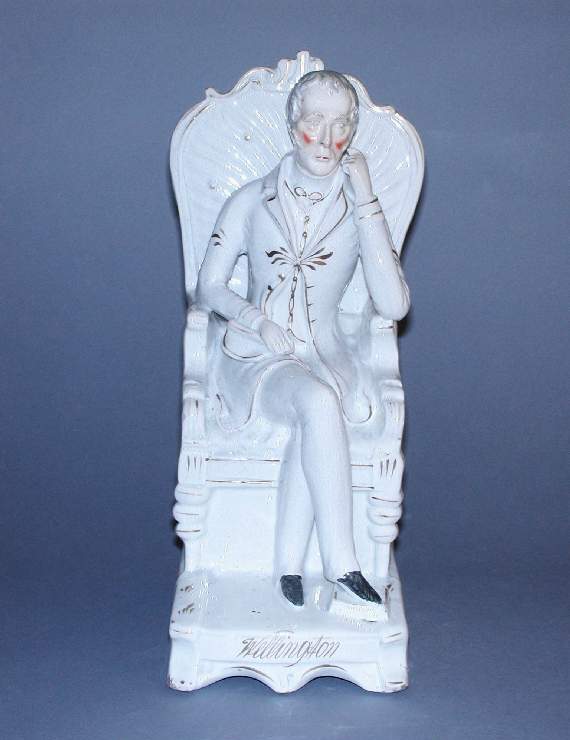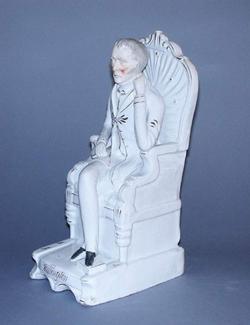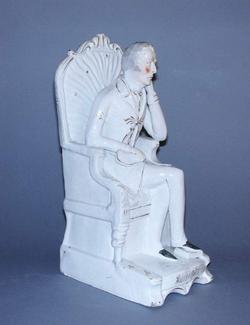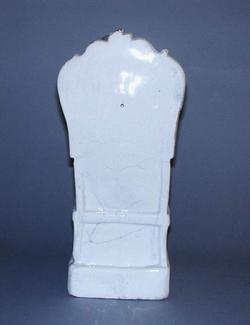Current Location: Gallery 27 (Glaisher)
Titles
The Duke of Wellington (seated)
Maker(s)
Production:
Unidentified factory
(Possibly Lloyd)
Entities
Categories
Description
White earthenware moulded in several parts and pearlware glazed. Painted with black, grey, red and flesh-pink enamels, and gold.
The Duke of Wellington, with grey hair and serious gaze suggesting the elder statesman, sits in a high-backed arm-chair, in relaxed but alert pose, with his left hand raised towards his head. His right hand rests on a hat, on his lap. His legs are crossed and his right foot rests on a cushion. He wears a jacket, waistcoat and bow tie, each edged and decorated with gilt; his shoes are black. His eyebrows are finely painted. The figure is mainly white, with features picked out in enamels and gilt. The base is rectangular base and outlined in gilt. It has a scalloped bottom edge at the front, with ‘Wellington’ inscribed in gilded script above.The underside is concave and glazed, with a round vent hole. The back is mainly flat, with vent hole 22.5cm from the bottom. There is no decoration to back or sides.
Notes
History note: 109 South 15th Street Philadelphia U.S.A. Bought on 23 April 1910, for $18, by Dr Glaisher, Trinity College, Cambridge
Legal notes
Dr J.W.L.Glaisher Bequest
Measurements and weight
Depth: 16.5 cm
Depth: 6.5 in
Height: 30.5 cm
Height: 12 in
Width: 12 cm
Width: 4.75 in
Acquisition and important dates
Method of acquisition: Bequeathed
(1928)
by
Glaisher, J. W. L., Dr
Dating
19th Century, Mid
Victorian
Production date:
circa
AD 1850
Note
Arthur Wellesley, first Duke of Wellington (1769-1852) was a British Field Marshall and elder statesman.. He is perhaps best known for his victory over the French, led by Napoleon, at Waterloo on 18 June 1815. From 1828-30 he was Prime Minister, and from 1834-1835 served as Foreign Secretary under Sir Robert Peel. Wellington died in his chair, at home in Walmer Castle, Kent and was given a state funeral at St Paul’s Cathedral.
Rackham (1935) lists this figure as of a type made chiefly by Sampson Smith at Longton. But it does not share features typically associated with the Samson Smith factory, which only began around 1851, and is more likely to have been made by one of the many other manufacturers of figures working in Staffordshire at this time. Although it is mainly unpainted, a version held by the Stoke on Trent Museum is well coloured, with underglaze blue jacket and with the chair-back and the top of the base painted in ‘feathered’ stripes , in pink and green respectively. This painting style is unusual, though has also been found on one or two other figures which may possibly have been made by John & Rebecca Lloyd, who made both earthenware and porcelain figures at Shelton, between 1834 and 1852.
There are also similarities between the moulding and scale of this figure and that of the collection’s other Victorian Staffordshire figure of Wellington (standing) (C.1001-1928), on which the purple trousers are painted in a similar ‘feathered’ stripe.
Wellington is shown as an elder statesman in his chair, so the figure was probably made towards the end of his life (he died in 1852). The source is probably a lithograph by Louisa Corbaux, in which Wellington sits, relaxed, in a high backed chair, which was published two dats after Wellington's death as the music cover for the song, 'Wellington', by Charles Jefferys.
School or Style
Victorian
People, subjects and objects depicted
Components of the work
Decoration
composed of
enamels
( black, grey, red and flesh-pink)
gold
Materials used in production
White earthenware
Lead-glaze
Techniques used in production
Press-moulding
: White earthenware moulded in several parts and pearlware glazed. Painted with black, grey, red and flesh-pink enamels, and gilt. The underside is concave and glazed, with a round vent hole. The back is mainly flat, with vent hole 22.5cm from the bottom. There is no decoration to back or sides.
Lead-glazing
Inscription or legends present
Inscription present: gilt script inscription, ‘Wellington’
- Text: Wellington
- Location: Front of base
- Method of creation: Painted in gilt
- Type: Title
Inscription present: rectangular paper label handwritten in black ink
- Text: Duke of Wellington [...] b. Philadelphia 23 April 1910
- Location: Underside of base
- Method of creation: Handwritten in black ink
- Type: Label
References and bibliographic entries
Identification numbers
Accession number: C.1022-1928
Primary reference Number: 71184
Old object number: 3421
Stable URI
Audit data
Created: Saturday 6 August 2011
Updated: Tuesday 30 April 2024
Last processed: Thursday 14 August 2025
Associated departments & institutions
Owner or interested party:
The Fitzwilliam Museum
Associated department:
Applied Arts







